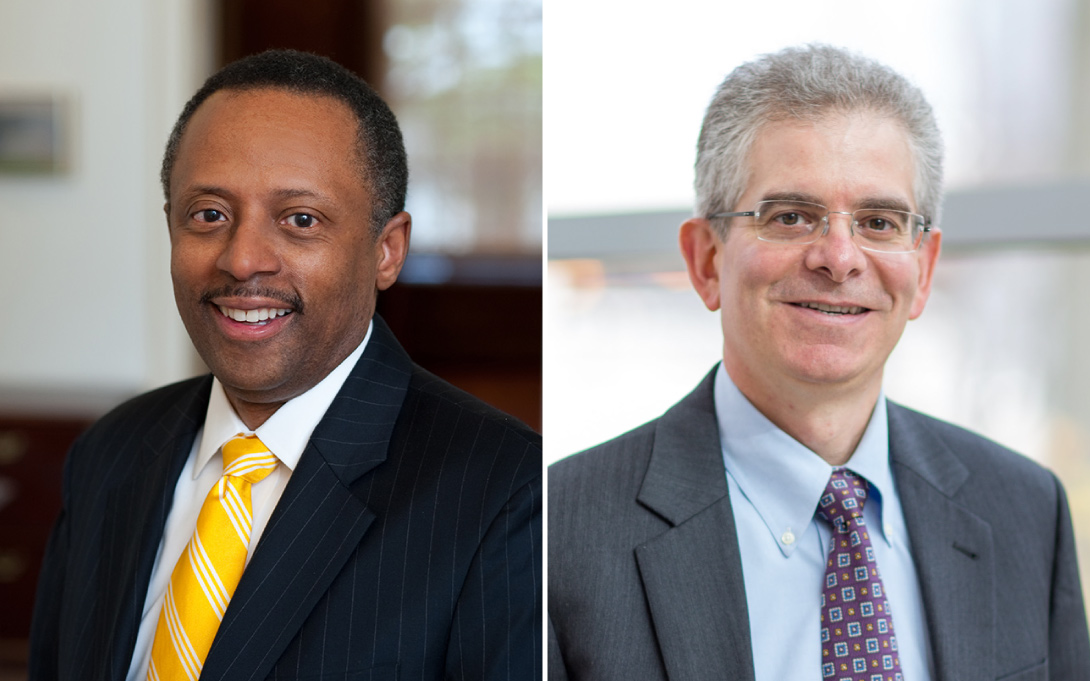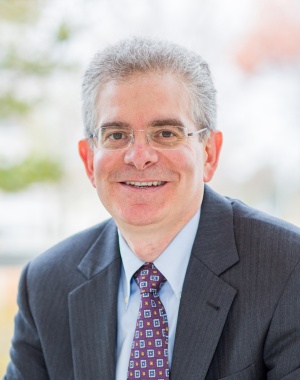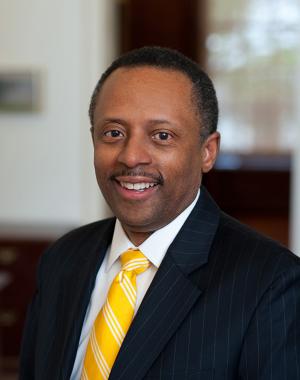
On November 3, the University of Michigan community gathered to listen to Ford School professors Earl Lewis and John Ayanian deliver their Distinguished University Professorship lectures. In her opening remarks, Provost Susan Collins said, "Occasions like this have a special meaning for the academy....Taking the time out to reaffirm our commitment to the importance of ideas and the light of the mind, for so many of us has compelled us to academia and kept us engaged in so many ways."
"We are particularly proud to be recognizing John Ayanian, Earl Lewis, and Janet Smith. In doing so, we celebrate the very best of our academic community here at the University of Michigan. So it's a special moment, an opportunity to pause in the really busy lives of scholars from across campus, as we honor the intelligence, curiosity, and commitment to learning, ideas, and knowledge that are the foundations of the academy."
Ayanian is the Alice Hamilton Distinguished University Professor of Medicine and Healthcare Policy, Professor of Health Management and Policy, Professor of Public Policy, and a practicing general internist at the University of Michigan. He has served since 2012 as the inaugural Director of the Institute for Healthcare Policy and Innovation which includes 675 faculty members from 15 schools and colleges at the University.
His talk, The Quest for Health Equity” focused on health disparities. "Now that we understand the extent of health disparities and why they arise and why they matter in terms of outcomes, what can we do to develop effective interventions in the policy world and in clinical practice outcomes to help to reduce and ultimately eliminate health disparities?"
Among his most important recent work at IHPI has been closely examining the effects of expanded Medicaid in Michigan, the “Healthy Michigan” program. The work has been widely cited in academic, media and political circles, which served as a model for other studies around the country about why the Affordable Care Act matters. 2000 reports to government agencies. The key elements: “Insurance and high quality care for all, diverse healthcare workforce delivering patient-centered care, accurate data to measure disparities, and measurable goals to achieve health equity.”
Among his most important recent work at IHPI has been closely examining the effects of expanded Medicaid in Michigan, the “Healthy Michigan” program. The work has been widely cited in academic, media and political circles, which served as a model for other studies around the country about why the Affordable Care Act matters. 2000 reports to government agencies. The key elements: “Insurance and high quality care for all, diverse healthcare workforce delivering patient-centered care, accurate data to measure disparities, and measurable goals to achieve health equity.”
Lewis, Thomas C. Holt Distinguished University Professor of History, is founding director of the Center for Social Solution as well as a professor of Afroamerican and African Studies and public policy. His talk, “How Questions of Power, Race and Identity Shaped a Career,” focused on the theme "All scholarship is autobiographical. Tracing his career, he looked at desegregation and his personal journey. He said he is part of a transitional generation of what occurred all over the country. In the 1970’s, there was a confrontation with the ideology of difference which gave Insight into power relationships. Concentration among black communities left them out of the power calculations, but it also gave them space to adjust to the interplay of events at work and at home. "It was difficult to study community formation without chronicling the ways race space and power flattened profound differences in people as they became their full selves," he said.
Watch the lectures.
From the speakers' bios
Earl Lewis
Earl Lewis, Thomas C. Holt Distinguished University Professor of History, Afroamerican and African Studies, and Public Policy, Professor of History, Professor of Afroamerican and African Studies, College of Literature, Science, and the Arts, Professor of Public Policy, Gerald R. Ford School of Public Policy
Social historian, award-winning author, and educational leader, Earl Lewis, is founding director of the Center for Social Solution as well as a professor of history, Afroamerican and African Studies, and public policy. President Emeritus of The Andrew W. Mellon Foundation, he previously served as provost of Emory University (2004-12), and before that as Vice Provost and Dean of the Rackham Graduate School (1998-2004). A frequent lecturer and the author or editor of nine books, scores of essays, articles and commentaries, he is a member of a number of national committees and boards of directors or trustees. He recently served as president of the Organization of American Historians. An alum of Concordia College-Moorhead (1978) and the University of Minnesota (Ph.D., history, 1984), he is the recipient of twelve honorary degrees, a member of the Council on Foreign Relations and a fellow of the American Academy of Arts and Sciences.
“How Questions of Power, Race, and Identity Shaped a Career”
When assessing a career, seldom are we invited to turn inward and examine the factors that contributed to a life’s professional pursuits. In considering what has motivated me to tackle certain questions over the arc of a career, I find myself returning to key moments in my transition from adolescence to adulthood. Growing up in the segregated South, and becoming a part of the transitional generation, those young people who massively desegregated southern public and private schools in the late ’60s and early ’70s, in hindsight, my school years deeply shaped the questions I have asked about the past and the ways in which my scholarship and institution-building have cohered over decades and across multiple institutions.
This lecture revisits those framing moments while focusing on questions of power, race, and identity, three themes that reoccur as focal points in several books, essays, and articles. Such a focus allows us to examine the ways African Americans made history and became the subject of history. This analytical lens updates an article that I published in 1995, “To Turn as on a Pivot,” which situated more than a century of scholarship about Black Americans and argued for attention to overlapping disaporas.
John Ayanian
John Ayanian, Alice Hamilton Distinguished University Professor of Medicine and Healthcare Policy, Professor of Internal Medicine, Medical School Professor of Health Management and Policy, School of Public Health Professor of Public Policy, Gerald R. Ford School of Public Policy, Director, Institute for Healthcare Policy and Innovation
John Z. Ayanian, M.D., M.P.P. is the Alice Hamilton Distinguished University Professor of Medicine and Healthcare Policy, Professor of Health Management and Policy, Professor of Public Policy, and a practicing general internist at the University of Michigan. He has served since 2012 as the inaugural Director of the Institute for Healthcare Policy and Innovation which includes 675 faculty members from 15 schools and colleges at the university. His research focuses on access to care, quality of care, and health equity. Since 2014, he has led a multi-disciplinary team conducting the federally authorized evaluation of the Healthy Michigan Plan, which expanded Medicaid to one million adults in Michigan. Dr. Ayanian is an elected member of the National Academy of Medicine, American Society for Clinical Investigation, Association of American Physicians, and Alpha Omega Alpha; and a Master of the American College of Physicians. He has received the John Eisenberg National Award for Career Achievement in Research from the Society of General Internal Medicine and the Distinguished Investigator Award from AcademyHealth.
“The Quest for Health Equity”
The United States faces a crisis of health disparities exacerbated by the COVID-19 pandemic, which has unmasked deep-seated racial, ethnic, and socioeconomic inequities in U.S. society. Dr. Ayanian will discuss how the field of health equity has developed over the course of his academic career, including his research and policy work focused on improving access to care, quality of care, and health outcomes by race, ethnicity, and insurance coverage in the U.S. health care system. He will also discuss the impact of the Affordable Care Act and continuing challenges to achieving health equity and racial justice in the United States.
Janet Smith
Janet Smith, Martha L. Ludwig Distinguished University Professor of Biological Chemistry, Medical School, Margaret J. Hunter Collegiate Professor in the Life Sciences, Associate Director, Life Sciences Institute, Professor of Biophysics, College of Literature, Science, and the Arts
Janet L. Smith uses X-ray crystallography to study physiologically important proteins and how they function.
She has helped determine the structure of many biosynthetic enzymes and several viral proteins, including those associated with the dengue, Zika, and West Nile viruses. Throughout her career, first at Purdue University and since 2005 as director of the University of Michigan Center for Structural Biology in the Life Sciences Institute (LSI), she has coupled a passion for developing new methodologies in structural biology to discovering insights into the biology of macromolecules. Professor Smith played an important role in U-M’s response to the COVID-19 pandemic by advancing development of a test to detect anti-SARS-CoV-2 antibodies. Associate director of the LSI since 2017, she is also an outstanding teacher and mentor and lectures internationally on structural biology and synchrotron radiation. She is a member of the National Academy of Sciences and received The Protein Society Dorothy Crowfoot Hodgkin Award in 2021.
“A Path to Discovering Biology in Protein Structure”
Scientific discovery is a journey along a path that starts with a question. And while each piece of an answer to the question brings new information, it also creates a fork in the path—reshaping the question, and our journey, as we decide which direction to take. This lecture will discuss how that path has unfolded not only in my research journey, but in my personal and career journey from a bookish childhood to a field of high-tech scientific research. My love of reading pulled me towards scholarship, the logic of molecules drew me to chemistry, the creativity of nature inspired my focus on biochemistry, the beauty of proteins lured me into protein crystallography, and the need for new technology in crystallography drove me to service for the scientific community. By exploring the twists and turns that opened with each new discovery, I’ve had the opportunity to witness how new technologies in my field helped many scientists “see” protein structures quickly, and I’ve experienced the joy of connecting protein structures to biological functions. My path through research has taken many unpredictable turns into new fields, while the love of reading that started me down this road remains unchanged.

